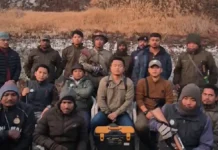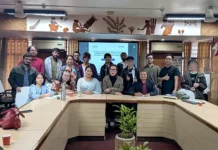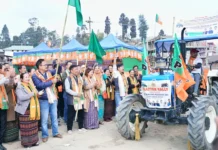[ Bagiso Hakung ]
We often forget in this competitive era that the beginning of a child’s education starts right from the moment he/she starts to see the world. Our every activity and environment shapes his/her character and wisdom; the better the environment in society, the better the mental health of the children in that society.
We are in an era of race and competition, and all parents want to admit their children to either private schools or to a central government school. State government schools are often forgotten, though they continue to be a ‘temple’ for the downtrodden and helpless parents who can only dream of enrolling their children in ‘elite’ schools.
In our society, a large section of our parents are illiterate or semiliterate. So it is likely that our society hasn’t even completed its first generation of education yet. It would be wrong to blame them for enrolling their children in private schools. It is the anxiety for their child’s future that compels them to opt for private schools, as our state government schools are almost on the verge of neglect. Most rural primary and middle schools face a shortage of teachers, teacher irregularities and infrastructural issues, leading to low enrolment and their eventual closure. The condition of secondary and higher secondary schools is not encouraging either.
I have tried to understand the sudden decline in education quality in government schools, especially in Anjaw and interior parts of Lohit, and feel that the following aspects have impacted almost every school:
1) Lack of reading resources, 2) Lack of qualified and committed teachers, 3) Lack of interest in studies, due to English language comprehension problems, 4) Lack of parental guidance, and 5) Lack of learner-friendly environment.
These basic aspects need to receive attention to bring education to life. Infrastructure is required, but is not as important as the quality of education.
Over the years, our lackadaisical attitude towards education, ignorance about fostering a learning-friendly environment, and lack of strong action against irregular teachers have cost us many years of education. Education before the year 2000 was even tougher and harder, but despite that, the seniors of that time received quality education and are in better positions now. The education after year 2000 seems disastrous, may be because of a lack of competition platforms, easy jobs due to backdoor entries, etc.
The sudden introduction of the APSSB in the recruitment of Group C & D jobs has raised competition to the apogee. It has made us realize that kids need a strong foundation; just qualifying in school exams is no longer enough, and apart from government jobs, other skills and professionalism are required to survive in this world.
It’s not that we don’t have educated elite and organizations that care about these problems. Yes, we do. We have student unions, welfare organizations, clan-based organizations, etc, but they have not been as effective as they should be.
As an executive member the All Mishmi Student’s Union (AMSU), I am often asked about our policies or steps taken to tackle these issues. This forces me to think about solutions, but honestly, I haven’t come across any ideas that would help us achieve anything in our limited tenure of three years. A long-rusted system cannot be brushed clean in one go; there’s no magic that can make it happen any sooner. It needs systematic treatment and may take years. Moreover, our area is geographically complex, and our people are both educationally and economically disadvantaged. Further, numerous other factors affect our education system. So it would be very hard for any government, CBO, or NGO to bring drastic changes in a short time.
A beacon of hope: Lohit Youth Library Movement
In January 2024, the AMSU and the Forum of Library Activists, Medo, had a meeting where we decided to work in collaboration for the betterment of the student community in the Lohit valley. Since then, I have participated in their activities, monitored and learned about their working mechanisms, aims, and aspirations. It has amazed me and I have learned a lot about them. Here’s why I think the youth library movement could be a game-changing factor in the educational scenario of our area:
The volunteers of the Lohit Youth Library Network have a forum called the Forum of Library Activists. Those who are unfamiliar with the network and the forum might be familiar with Bamboosa Library and its volunteers or might have heard of Padma Shri awardee Uncle Moosa. His noble efforts to encourage young minds in Arunachal Pradesh started more than four decades ago. He is guiding children in education through various library initiatives. The foundation of his work in Lohit and Anjaw began with the establishment of the Bamboosa Library in Tezu and the APNE Library in Wakro in 2007. Subsequently13 libraries came up across the Dibang-Lohit region. A few vacation mini-libraries also came up in the villages around Wakro.
Most of us misunderstand the term ‘revolution’ to mean an instantaneous transformation or associate it with grand, sweeping changes led by influential individuals or entities. However, a revolution can also be a series of small, incremental steps that collectively bring about significant changes.
The volunteers of Lohit youth library movement embody the spirit of revolution. Their motto ‘Spreading the joy of reading’ aims to provide opportunities to underprivileged and reading-deprived students to learn and embrace literature. As Uncle Moosa says, “If readers cannot come to books, books must go to the readers,” which means that distance and geography shouldn’t be a barrier for readers and book lovers. Their various initiatives are shaping the future of students. Instilling a love for books and building reading habits in children in both rural and urban areas is their goal. Through exceptional storytelling, poem recitation, and skits, the library volunteers create a reading-friendly environment that attracts children. This approach is crucial in building confidence, cognitive development, and intelligence in children. (Bagiso Hakung, a postgraduate in economics from Rajiv Gandhi University, is the IPR secretary of the AMSU.)




